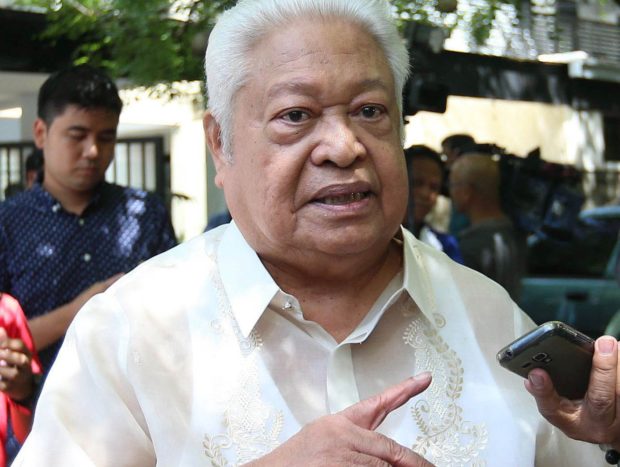High debt service, fiscal deficit? Why back Maharlika fund, asks Lagman

Albay 1st District Rep. Edcel Lagman (INQUIRER FILE/EDWIN BACASMAS)
MANILA, Philippines — If the country already has a high debt service within the proposed2024 national budget — which will also likely face a fiscal deficit — opposition lawmaker and Albay 1st District Rep. Edcel Lagman wonders why the government insists on bankrolling the Maharlika Investment Fund (MIF).
Lagman posed the question on Thursday during the start of the deliberations for the proposed P5.768 trillion 2024 national budget, after officials from the Development Budget Coordination Committee (DBCC) admitted that debt servicing — if including interest payments, net lending, and principal amortization — will be P1.939 trillion.
The amount accounts for almost 33 percent or one-third of the proposed budget. Meanwhile, Budget Secretary Amenah Pangandaman told Lagman that the fiscal deficit is at 5.1 percent of the budget, indicating that around P294.1 billion is unfunded.
“Since we have a fiscal deficit, may we know where the government is going to source its subscription of P50 billion to the Maharlika Investment Corporation?” Lagman asked.
Debt service is the amount in the proposed budget allocated to pay debts, while the fiscal deficit is the amount of allocations the government cannot fund using its collected revenues.
Article continues after this advertisementIn response, Finance Secretary Benjamin Diokno said Bangko Sentral ng Pilipinas (BSP) dividends would help kickstart the MIF — the country’s first sovereign wealth fund which President Ferdinand Marcos Jr.’s administration intends to use to fund infrastructure projects and generate income.
Article continues after this advertisementDiokno also mentioned other possible funding sources, but Lagman said it appears that the government is bent on prioritizing the MIF rather than using the funds that would be pumped to the sovereign wealth fund to reduce debt servicing and ensure that funds are available for most items in the proposed 2024 budget.
“It’s stated in the law, your Honor, the Central Bank dividends, in fact, the Central Bank has already declared P31.2 billion dividend so that’s the law says for two consecutive years we can use the BSP dividend, we can also source it from Pagcor (Philippine Amusement and Gaming Corporation), we can source it from royalties from mining, privatization, there are many other sources, your Honor,” Diokno said.
“Well, in other words, we are prioritizing the funding for the MIF, and we are not giving preference to budget support for the budget or the expenditure program so much so that we are not able to reduce our fiscal deficit by sourcing more funds to support the budget,” Lagman replied.
Proponents of the MIF believe that since the sovereign wealth fund would shoulder funding for big projects, it would allow the government to use the annual budget for other items like social services.
READ: Bongbong Marcos signs Maharlika Investment Fund into law
READ: Maharlika Investment Fund Act of 2023 to help finance big projects – Romualdez
However, there have been questions about the need for the MIF, given that the country’s debt has been growing. As early as December 2022, opposition lawmakers like ACT Teachers party-list Rep. France Castro said it would be improper to create the MIF amid a huge debt.
Budgetary support
Before his questions about the government’s seeming prioritization of the MIF, Lagman asked Diokno how the government could ensure funding for the country’s projected expenditures.
Diokno said that the government could ensure that the proposed expenditures are funded, but that would mean reducing allocations for key programs like big-ticket infrastructure projects.
“We can decrease, but then we have to sacrifice some of the essential programs of government like, we want to spend five to six percent for capital formation or infrastructure. So if you force us to reduce it to say three percent, then we will have to cut back on some of our social programs and fiscal infrastructure program,” the Department of Finance (DOF) head said.
Lagman said that he was not thinking of reducing allocations for projects. Instead, he is considering if the BSP can lend the government some funds like what happened in the past.
Diokno — a former BSP governor — said that lending to the government only happened due to the COVID-19 pandemic, which was an extraordinary circumstance.
“What I am suggesting is we can reduce it without sacrificing our expenditures. For example, there was a time — and this was followed years back, including the immediately preceding years, that the Central Bank would provide an interest-free loan to the country for budgetary support,” the lawmaker said.
“There is no justification to follow that budgetary support from the Bangko Sentral for the next fiscal year considering that we have a huge fiscal deficit?”